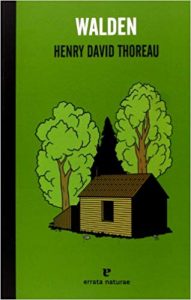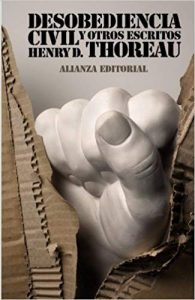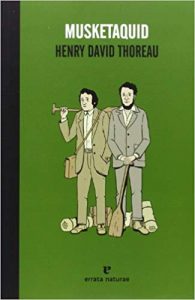The encounters between philosophy, literature and essays are concentrated in a few cases in the history of literature. Being rare and manifesting as such in any area does not always facilitate the integration of the person. But the repercussion of the work of a strange guy like Henry David Thoreau it has a lot to do with his exceptional and strange vision of literature as the compendium between thought, literature and life.
Contemporary of nathaniel hawthorne, and also a native of Massachusetts further north, David Thoreau was his antithesis in literary terms. But with both, you can enjoy that polarized complementarity that spans an entire era of the nineteenth century.
Henry David Thoreau's bibliography has a lot of biography, becoming an example of a vitalist writer who squeezes his own world to express his vision of things with the intensity of a guy always involved in transcendental demands and struggles.
Top 3 Recommended Books By Henry David Thoreau
Walden
Diary of the hermit par excellence, a logbook on the mainland of a new castaway in the world advanced a century after Robinson Crusoe, with the new dilemmas of the nineteenth century instead of the romantic touch of the old character of Daniel Defoe. Thoreau decides to get away from the madding crowd (although scarce in his melancholic Concord of wooden houses) and takes us with him to rethink the world.
A book that is enjoyed towards that ideal of the intensity of life that has nothing to do with promptness but with patience, not at all with the immediate but with what is longed for over a slow fire. A book written in these conditions points to that essential adventure of the human being reconciled with his environment, with no other concern than to communicate again with the elements, surrendering himself to the essential daily tasks in which the intelligence of man achieves its basic, atavistic goals. Of course, after that summer of 1845, devoted to inner peace and abandonment, Thoreau returned to tell it, and that says a lot about the unsustainable of loneliness for a long time.
But Thoreau knew how to capture his experiences and notions of those days as an idealistic manual that penetrated and still penetrates any person who meditates about our social evolution plagued with injustices and imbalances of the individual between the collective. And especially in the irrelevance of the material compared to the feeling of a time in solitude that confronts you with the feeling that extreme life, with its lights and shadows, is just that, silence and the feeling of belonging to a place and a moment. .
Civil disobedience
It is curious how conscientious objection that can lead the individual to civil disobedience can become a thrown weapon for those who intend to alter any established order (authoritarian or democratic), without differentiating the nature of that order. Disobeying is human in the personal and tendentious, manipulable and very questionable in the group.
Like any good book, many times this nonconformist manual, this bible of the objection of consent and even the insubordination is used with the bad taste of the manipulative interest of the community rather than with the will of particular conviction to search for one's own path. For the days that Thoreau had to live, his works show that ideological advancement of an extremely critical character who discovered the trompe l'oeil of the social, hidden in those days still in almost religious fears, in the crack of the whip or in the roar of the weapons.
The only revolution that emerges in this book is the one that concerns oneself faced with the unjust, but never led towards other ideologues who, as cyclically demonstrated, extinguish their libertarian yearnings as soon as they reach the calm waters of power and its opportunistic currents. able to justify everything.
musketachid
In Walden Thoreau he found himself. In Musketaquid, or at least in the writing of the Musketaquid trip, Thoreau had previously lost himself in the solitude of absence. In the meantime, five years ...
Because his brother John was a vital partner in the adventure that took them on the Musketaquid boat that they both launched on the Concord River and together they shared the love disappointment that perhaps could have led them to conflict for the same feeling about the same woman. And yet they decided to travel through the mighty Merrimack or Sudbury. The trip achieved the most desired effect of reconciliation, reunion and union. Until John passed away in the most unexpected way.
The narration of the trip acquires that incomparable taste of adventure about the life that flows on board a boat with someone as close as a brother. Surely the composition of the story would lead the author to melancholic thoughts. But writing is a philosophical teaching on that life undertaken with courage, determination and determination to face dangers. Because coincidences and fatalities are already in charge of arriving alone, whether or not you are afraid of them.



